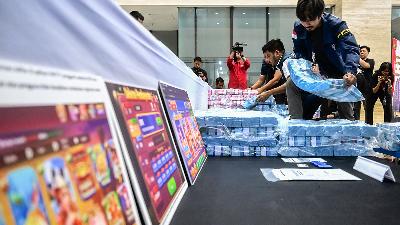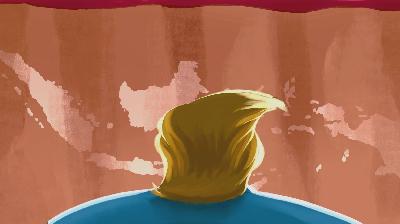Wrong Approach to Climate Crisis Mitigation
Monday, November 18, 2024
Hashim Djojohadikusumo is leading the Indonesian delegation at the climate change conference COP29 in Azerbaijan. But he is more a representative of corporate interests.
arsip tempo : 174556904144.

THE appointment by Prabowo Subianto of Hashim Djojohadikusumo as the Special Presidential Envoy for Climate and Energy has prompted many questions. Although he was not among the special envoys appointed on October 22, suddenly Hashim is leading the Indonesian delegation at the United Nations 29th Climate Change Conference, or COP29. Is this because he is Prabowo’s younger brother?
Traditionally, COP delegations include ministerial officials that have technical expertise and a deep understanding of environmental issues. But at COP29 in Baku, Azerbaijan, a tycoon without a history of involvement in climate change suddenly appeared as Indonesia’s representative. His selection is not only a break with tradition, but also has given rise to concerns about the direction of government policy.
Hashim’s position also reveals a conflict of interests because he has admitted his presence in COP29 is as a businessperson. At the Indonesian Pavilion, Hashim has been promoting the green activities of his corporation, the Arsari Group. One of its proudest achievements is the Orangutan Sanctuary Center in Penajam North Paser, East Kalimantan. But this move appears to belittle a national mission. Forums like COP are places for nations to talk about collective action to save the planet, not for corporate exhibitions.
In his speech representing the nation to global delegates at COP29, Hashim also behaved like a businessperson. He promoted methods of mitigating the climate crisis through trading schemes, such as the potential for 557 million tons of carbon credits and the need for US$235 billion to fund the reforestation. There was hardly any information about the government’s efforts to reduce carbon emissions or to protect its people from the impact of the climate crisis.
Through Hashim, it is as if the government wants to commercialize the climate crisis in order to erase traces of corporate ecological crimes. Instead of pushing for the reduction of emissions from the plantation, forestry and mining sectors, the government is focusing on carbon trading. But the fact is that the carbon business is owned by a group of companies that have been responsible for damaging forests. In this context, Hashim and Prabowo are caught up in a conflict of interests. On June 24 this year, this weekly reported on the maneuvering by people around Prabowo in relation to the carbon business.
Hashim’s speech also contained many contradictions. He stated that the government was committed to achieving zero emissions by 2060, but was also sticking to its 8 percent target for economic growth. However, projects such as downstreaming nickel in Sulawesi and Maluku or the food estates in Papua actually accelerate deforestation. This is at odds with the FOLU Net Sink 2030—Indonesia’s commitment to reducing deforestation by 4.22 million hectares.
Hashim’s statement about Prabowo’s initiative to reforest 12.7 million hectares of critical land was also questionable. Will this land include social forests that have been managed by local people? If yes, this policy has the potential to take away the rights of indigenous people, while the major corporations that have been responsible for most of the environmental damage will still escape their responsibilities.
The government should use COP29 as a stage to show Indonesia’s commitment to saving the planet, not as a forum for reinforcing the interests of a small number of elites and cronies.











